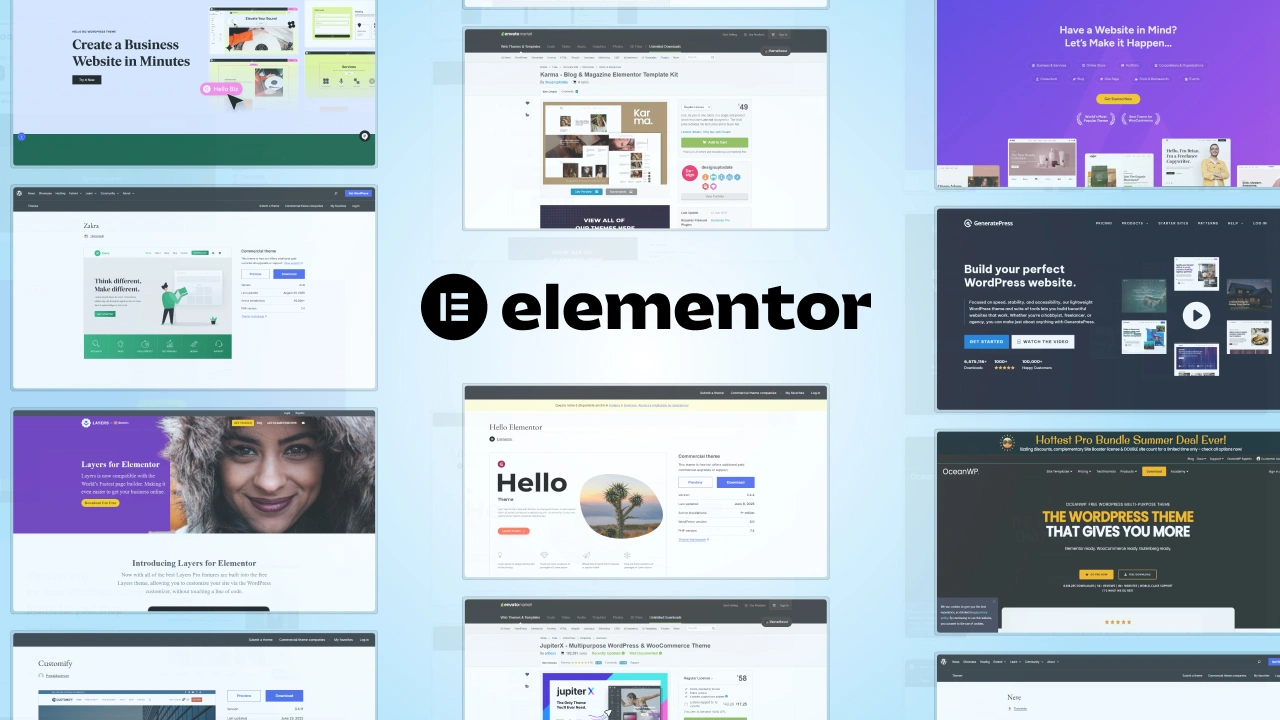Comparing Thinkific vs WordPress isn’t straightforward. They both enable you to build and sell online courses. But Thinkific positions itself as an all-in-one platform for creating your online business.
From websites to landing pages, marketing funnels, email campaigns, and payments, Thinkific has everything you need to create online courses, membership sites, coaching programs, and much more.
WordPress, on the other hand, requires you to use plugins to make it suitable to function as a course creation platform, sell digital downloads, and offer membership programs.
Let’s find out how they stack up against each other and which platform suits your needs better.
What is Thinkific?
Thinkific is an online course creation platform that enables you and your business to quickly and easily share your expertise with the world. Thinkific provides over two tools to create, market, and sell your own courses and even membership sites.
Thinkific is fully branded to you, from the design, structure, and content to the creator. Thinkific practically enrolls students in your courses, handles payment processing and practice, hosts your course videos and course materials, among other roles.

Whether you’re an expert to get paid for your knowledge, your business needs to train employees or customers, and a creative entrepreneur looking to build and grow an online education brand.
What is WordPress?
WordPress is a versatile content management system (CMS). For years, it has been a powerful engine behind your website or blog that provides a solid foundation and user-friendly tools to create and manage every type of website.
Whether you want a business website, an e-commerce store, a captivating portfolio, or an engaging personal blog, WordPress has everything to cater to your needs.

WordPress stands out for its exceptional adaptability. You can customize its look and feel with countless design themes and improve its abilities with a vast library of plugins.
Got stuck with a problem while using WordPress? WordPress comes with a passionate global community, it remains secure, up-to-date, and at the forefront of web technology thanks to its open-source nature.
A quick breakdown of Thinkific and WordPress as online course providers
Thinkific is a wonderful platform that has been developed with a single purpose in mind: to help you create and sell courses. The course builder is made up of a set of blocks arranged in a familiar column grid that can be moved about by dragging and dropping.
Thinkific is easy to use, giving all the benefits of a modern user experience. It is compatible with a wide range of media types and includes a variety of interaction possibilities, such as quizzes, surveys, and discussions, to engage your learners more in the learning process.
Thinkific also allows you to stagger the publication of your content and enables you to accept one-time or subscription payments. It boasts integrated marketing options, secure cloud hosting, and comprehensive analytics, making it simple for you to advertise your courses, manage your learners, and keep track of your success.
WordPress, exclusively made for course owners, can be adapted to host courses due to plugins like LearnDash and WP Courseware. WP Courseware requires a bit more setup, but once up and running, you’ll find you have many possibilities for tweaking your site.
While Thinkific will suffice for many purposes, WordPress is the ideal solution if you desire full control over the design and layout of your website and content.
WordPress allows for the use of various plugins for student management systems, sophisticated analytics, and advanced security. However, the dependency on plugins creates the responsibility of ensuring that these plugins are up-to-date and securely integrated.
Here’s a side-by-side Thinkific vs WordPress features to compare.
| Features | Thinkific | WordPress |
|---|---|---|
| Customizable website themes | Thinkific gives you customizable themes | A large proportion of WordPress themes have customization options. |
| Multiple pages | Thinkific lets you grow your site beyond sales pages. You can add a home page, instructor bio pages, a testimonials page, and many more. | With WordPress.com, you can have an unlimited number of pages on your website. |
| Custom domains | Thinkific comes with a custom domain. | You need to connect your custom domain to the WordPress.com website. |
| Plugins/Apps | Thinkific gives you access to 80+ apps in the Thinkific App Store for an enhanced learning experience. | WordPress offers close to 60,000 free plugins and numerous premium options. |
Caution: With the flexibility that WordPress provides, it comes with a bit of a steep learning curve. You will probably need to know at least some basics of web design or be willing to put in the time to learn it.
Making a Choice: If you are looking for a place where you can have all the tools available to launch courses that are tastefully and effectively delivered, then choose Thinkific. However, WordPress is better if customization and having complete control are what you need.
Thinkific vs WordPress: A Comprehensive Comparison
Before deciding which platform to use between Thinkific vs WordPress for delivering online courses, it is essential to consider the specific needs of your programs and the available resources to administer your platform.
1. Thinkific is Designed for Online Courses as Opposed to WordPress
The former, Thinkific, is an online course platform that brings all you would need to create, market, and effectively sell your courses. It is an all-in-one platform, thus all the primary features such as payment integration, student management, and content hosting are integrated and designed with educational needs in mind.
On the other hand, WordPress is a content management system that requires additional plugins to develop online courses. Although one can get all the features through plugins to allow extensive customization, Thinkific would be easier and quicker to set up and start using.
2. Thinkific Comes with a Monthly Fee. Calculating WordPress Fee Comes with Complexities
In terms of pricing, Thinkific adopted a subscription-based model and charges a monthly fee depending on the feature level you wish to have live on your courses. The fee starts from $36/month, billed annually.
The subscription fee covers web hosting, security, technical support, and integrated support tools, which is easy for any course provider to include in their budget.

On the other hand, WordPress may require web hosting charges, custom themes that could be expensive, plugins, and development costs for customization, among others.
Although WordPress is free to download, the cost of ownership would be higher with the plugin charges mounding up.
3. Both Platforms are Scalable, Flexible, and Customizable
Both platforms can accommodate a few to many thousands of students, providing an abundant customization medium.
Customization of your site would be easier in Thinkific as users would only need to drag and drop the tools, content, and design, while WordPress requires a developer.
Other than flexibility, WordPress has a vast ecosystem of themes and plugins to choose from but requires prior technical knowledge, which only a developer could provide.
4. With Thinkific You’ll have Hewer Tech Issues, Whereas WordPress Needs Help to.
While Thinkific offers dedicated technical support, WordPress relies on the WordPress community for technical support.
This means that while help is available, it may involve the plugin owner or a paid third-party plugin provider, rather than hands-on help technology-wise from the platform.
With Thinkific, users are guaranteed immediate attention from a team of experts whenever help is required.
Setting up a WordPress Course Platform Requires a Developer. Whereas Thinkific Maintains Everything For You
Setting up a course platform on a WordPress website will likely require the additional input of a developer, while Thinkific handles the rest on the user’s behalf.
Essentially, with Thinkific, users are only concerned with updating the course content, while the platform handles the updates and maintenance end. WordPress users enjoy more control, yet they have the extra job of updating and maintaining the platform and solving any arising technical issues.
6. Both Thinkific and WordPress give you dedicated support
Both Thinkific and WordPress prioritize dedicated support to their customers. In its new version, Thinkific has experts in various fields such as marketing, web design, and content creation.
Thinkific connects users with an expert in any of the given fields should they require additional help. WordPress.com now offers email support in all paid plans and chat support in the annual Explorer, Creator, and Entrepreneur plans ensures quick access to help with user-specific assistance levels.
Thinkific vs WordPress: Final Verdict
To conclude, there is no correct answer on whether to choose Thinkific vs WordPress for your online course. This decision heavily depends on what exactly you require and how these courses relate to your business activity or educational concepts in general.
You should choose Thinkific if you:
- Want to get online urgently with a minimum of technical difficulties
- Want to work with a product that is dedicated to creating courses and that provides a more focused and streamlined experience.
- Have a stable budget and you want to work with fixed monthly payments.
- Need support, a straight translation, and minimal technical hassle from the moment you begin setting up your first course to hours from now when you deliver it.
Thinkific is the opportunity for you to start immediately and utilize existing features and tools to achieve visual material completion. Due to a user-friendly design, getting the support that you need, and spending your time creating a course that matters.
Select WordPress if you:
- Have completely customized control over all the aspects of the site.
- Install the courses as a piece of the larger website.
- Have some technical knowledge or hire a WordPress developer from dedicated WordPress website development agency.
- You’re ready to invest more in the future and actively manage your project cost.
Both options help develop future e-learning and easily share knowledge with the rest of the world. However, be guided by the assessment of your skills and needs when choosing, and get pleasure from great lessons.





